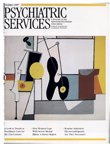Computer-facilitated therapy for inpatients with schizophrenia
Abstract
The authors present three case vignettes in which inpatients with schizophrenia participated in psychotherapy sessions that included three phases: traditional verbal psychotherapy, computer-facilitated therapy, and recapitulation of the session. In the computer-facilitated phase, the therapist typed the conversation between the patient and therapist, and the patient was able to look at the computer screen to review what was said. Clinical observation was used to determine patients' frequency of delusional symptoms during the first two phases. For all three patients, the frequency of delusional symptoms decreased from the first to the second phase. The computer, by visually representing words, may facilitate communication by compensating for deficits in auditory processing, information processing, attention, and memory often found among patients with schizophrenia.



